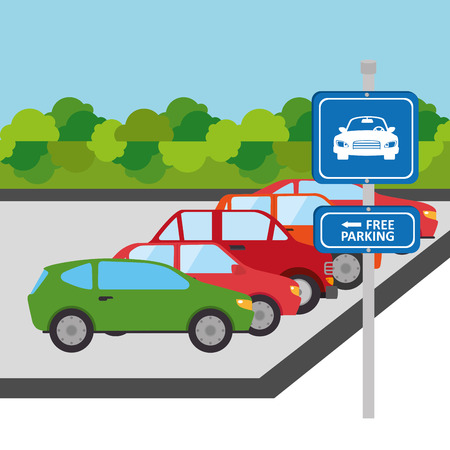Introduction to Parking Fines in the UK
Parking fines are an all-too-familiar part of motoring life across the United Kingdom, often sparking frustration and confusion among drivers. Whether you’ve returned to your car to find a yellow slip on the windscreen or received an unexpected letter through the post, understanding the source of your parking fine is crucial. In the UK, there are two main types of parking penalties: those issued by local councils and those handed out by private companies. While both may look official and demand payment, they are governed by different rules and offer distinct rights and avenues for appeal. For British motorists, knowing the difference between council-issued Penalty Charge Notices (PCNs) and private Parking Charge Notices can make a significant difference—not just financially, but also in how you respond to and resolve these fines. In this guide, we’ll break down the key differences, explain your legal rights, and help you navigate the complex world of parking enforcement in Britain.
2. What Are Council-Issued Parking Fines?
Council-issued parking fines, officially known as Penalty Charge Notices (PCNs), are penalties enforced by local authorities across the UK when motorists breach parking regulations on public roads or council-managed car parks. Unlike private parking fines, which are issued by companies managing private land, PCNs are backed by statutory law and follow a strict legal process. Local councils have the authority under legislation such as the Traffic Management Act 2004 to regulate parking and issue fines to maintain road safety and traffic flow.
Parking fines from councils are typically issued for offences such as overstaying in a pay-and-display bay, parking without a valid ticket or permit, stopping on double yellow lines, or blocking dropped kerbs. These fines are either placed on your vehicle’s windscreen or sent via post if captured by CCTV enforcement. Importantly, council-issued PCNs must clearly state details of the alleged offence, the contravention code, location, date, time, and instructions on how to pay or appeal.
| Feature | Council-Issued Parking Fines |
|---|---|
| Authority | Local Council (Public Body) |
| Legal Backing | Statutory Law (e.g., Traffic Management Act 2004) |
| Typical Locations | Public roads, council-run car parks |
| Appeal Process | Formal process with independent adjudication (Traffic Penalty Tribunal or London Tribunals) |
| Non-payment Consequences | Enforcement agents (bailiffs), increased charges, possible court action |
The process is designed to be transparent and fair. If you receive a PCN, you have the right to challenge it if you believe it was wrongly issued. Councils are obliged to consider appeals and provide clear evidence supporting their case. Should you wish to contest further, cases can be escalated to an independent tribunal free of charge. This robust legal framework means council-issued parking fines carry more weight than private penalties and ignoring them can lead to escalating costs and legal consequences.

3. Understanding Private Parking Fines
When you park on private land—think supermarket car parks, retail parks, hospitals, or residential developments—you may encounter parking charges issued by private companies rather than the local council. These are commonly referred to as Private Parking Charges or Private Parking Notices (PCNs), though it’s crucial to note that these are not the same as Penalty Charge Notices issued by councils.
Who Issues Private Parking Fines?
Private parking fines are typically handed out by parking management firms contracted by landowners. Some of the most familiar names in the UK include ParkingEye, Euro Car Parks, and Smart Parking. Their remit covers a wide range of locations—from shopping centres and gyms to business parks and apartment complexes.
The Legal Standing of Private Parking Fines
Unlike council-issued penalties, private fines are essentially invoices for breach of contract. When you drive onto private land and see clear signage outlining parking rules and fees, you’re effectively entering into a contract with the landowner. If you overstay your welcome or fail to pay for parking, the company may issue a notice demanding payment.
Do They Have Real Authority?
This is where it gets interesting. While these companies have the right to pursue payment through civil means, their notices do not carry the same legal weight as those from local authorities. If you ignore a private parking fine, the company can take you to small claims court—but they cannot simply register it as a debt or escalate it in the same way councils or police-issued fines can. The British Parking Association (BPA) and International Parking Community (IPC) set industry standards, but their powers are limited to their members’ conduct rather than enforcement of fines themselves.
Understanding this distinction is vital before deciding how to respond to any parking fine received on private property in the UK.
4. Key Differences Between Council and Private Fines
When it comes to parking fines in the UK, its crucial to understand that council-issued Penalty Charge Notices (PCNs) and private parking charge notices are fundamentally different in several ways. Below, we’ll break down their legitimacy, enforcement powers, appeals processes, and payment requirements so you can handle each with confidence.
Legitimacy
| Aspect | Council-Issued Fines | Private Parking Fines |
|---|---|---|
| Legal Status | Enforced under statutory law (e.g., Traffic Management Act 2004) | Treated as a contractual dispute – not criminal or statutory |
| Authority | Issued by local authorities or Transport for London | Issued by private companies managing car parks on behalf of landowners |
Enforcement Powers
| Aspect | Council-Issued Fines | Private Parking Fines |
|---|---|---|
| Collection Methods | Councils can pursue unpaid fines through the Traffic Enforcement Centre; bailiffs may be used after court order | Private firms must take you to the small claims court; they cannot use bailiffs without a court judgment |
| Powers of Entry/Seizure | Possible if escalated to warrant stage via courts | No direct powers unless judgment is obtained from court |
Appeals Process
| Aspect | Council-Issued Fines | Private Parking Fines |
|---|---|---|
| Initial Appeal Route | Formal appeal to council within 28 days of issue; further appeal possible via an independent adjudicator (e.g., London Tribunals or Traffic Penalty Tribunal) | Appeal to parking company first; if rejected, escalate to POPLA (for BPA members) or IAS (for IPC members) |
| Costs for Appeal | No charge for appeals process at any stage | No charge for initial appeal; some schemes may charge for further escalation, but generally free for consumers |
| Lodging Evidence & Representation | You can submit written or online evidence; hearings available in person, by phone, or in writing | Mainly written submissions; limited opportunity for oral hearing |
Payment Requirements & Consequences of Non-Payment
| Aspect | Council-Issued Fines | Private Parking Fines |
|---|---|---|
| Discount for Early Payment | Usually 50% discount if paid within 14 days | Often a reduction if paid quickly, but varies by operator |
| If Unpaid | Notice to Owner sent, then increased penalty, then possible court/bailiff action | Pursuit via debt collection letters; only enforceable through civil court proceedings if pursued further |
The bottom line? Council-issued fines carry statutory authority and are backed by stronger enforcement mechanisms. Private fines rely on contract law and require additional legal steps before any real consequences apply. Knowing these differences helps you decide how best to respond if you find one stuck to your windscreen.
5. How to Respond to Each Type of Fine
If you receive a parking fine in the UK, the first step is to identify whether it’s been issued by the council (local authority) or a private company. Your approach will differ depending on the type of notice, and responding appropriately can save you both time and money.
Check the Details Carefully
Start by inspecting the ticket—council-issued fines are usually called Penalty Charge Notices (PCNs), while private ones might be labelled Parking Charge Notices but look similar at first glance. Double-check dates, times, and location details for accuracy, as mistakes can strengthen your case if you choose to challenge the fine.
Council-Issued Fines
If it’s a council-issued PCN, you typically have 14 days to pay at a discounted rate or 28 days for the full amount. If you believe the fine is unfair—for example, incorrect signage or an error in your vehicle registration—you can make an informal challenge online or in writing. The council must consider your appeal and respond within a reasonable timeframe. If your initial challenge is rejected, you’ll receive instructions on making a formal representation and potentially appealing further to an independent adjudicator.
Private Parking Fines
Private parking companies must be members of an Accredited Trade Association (ATA) to access keeper information from the DVLA. If you get a ticket on private land, don’t ignore it—however, only pay if you’re convinced it’s valid. First, check if the signage was clear and terms were fair. You can appeal directly to the parking operator; if unsuccessful and they’re ATA members, escalate your appeal to POPLA (Parking on Private Land Appeals) or IAS (Independent Appeals Service), depending on their affiliation.
Lodging an Appeal: Key Steps
– Gather evidence: photos of signs, tickets, correspondence
– Keep records: save all letters and emails
– Meet deadlines: appeals are time-sensitive
– Be concise: state facts clearly and avoid emotional arguments
If you decide not to pay and lose your appeal, private firms may pursue civil recovery through county court but cannot issue criminal penalties like councils can.
Summary
The main takeaway is never to ignore a parking ticket—whether from the council or a private firm—and always check your rights before paying or appealing. By understanding the process and responding promptly with well-prepared evidence, you put yourself in the strongest position to resolve the matter fairly.
6. Protecting Your Rights and Avoiding Common Mistakes
When faced with a parking fine, whether from a private company or your local council, understanding your legal rights is the first line of defence. Here are some practical tips for UK motorists to help you stay on the right side of the law, avoid unnecessary payments, and deal confidently with both types of fines.
Read All Correspondence Carefully
Always check the details on any parking ticket or notice you receive. Make sure the registration number, location, and time are correct. For private parking charge notices (PCNs), verify that all required information is present and that the company is a member of an Accredited Trade Association (ATA), such as the British Parking Association (BPA) or International Parking Community (IPC). If it’s a council-issued penalty charge notice, ensure it was issued by an authorised officer.
Don’t Ignore Legitimate Notices
It’s tempting to ignore a parking ticket in hope it’ll disappear, but this approach can backfire. Council-issued penalties can escalate quickly, leading to increased charges and possible court action. Private companies may pursue unpaid charges through debt collectors or small claims court. Always respond promptly—either pay, appeal, or request more information if you think there’s been a mistake.
Avoid Making Unnecessary Payments
If you believe a private fine is unfair or incorrectly issued, don’t rush to pay just to make it go away. Check if the signage was clear and visible, and whether the terms and conditions were reasonable. For council fines, check if there are any valid grounds for appeal, such as unclear markings or faulty ticket machines. Remember: paying a private parking charge is not always legally enforceable unless ordered by a court.
Gather Evidence
Take photos of signs, road markings, your vehicle’s position, and any pay-and-display tickets or receipts. Keep all correspondence related to your case. This evidence will be invaluable should you need to challenge either type of fine.
Know the Appeals Process
Council-issued fines have a formal appeals process: start by making an informal challenge, then proceed to a formal representation if rejected. Private tickets can be appealed via the operator’s procedure and escalated to an independent adjudicator such as POPLA or IAS if needed. Deadlines are strict—mark them in your calendar to avoid missing out on your chance to contest unfair fines.
Check for Errors and Technicalities
Both councils and private companies must follow certain procedures when issuing fines. Any procedural slip-up—such as late delivery of notices or incorrect paperwork—can be grounds for cancellation. Be vigilant about these technical details; sometimes they’re your best defence.
Stay Calm and Informed
Finally, don’t let aggressive language in letters intimidate you into paying straight away. Know your rights, use official government websites for guidance, and seek advice from organisations like Citizens Advice if you’re unsure. By staying calm, organised, and informed, UK motorists can protect themselves from common pitfalls while dealing with both private and council-issued parking fines.
7. Resources and Where to Get Help
If you’re facing a parking fine—whether it’s private or council-issued—it’s important to know where to turn for reliable information and support. Here is a list of trusted UK resources, helplines, and organisations that can help you understand your rights, challenge unfair tickets, or get impartial advice:
Official Government Guidance
- GOV.UK – The official government portal (gov.uk/parking-tickets) provides up-to-date guidance on both council and private parking fines, including how to appeal.
Independent Advice Services
- Citizens Advice – Offers clear, step-by-step support on disputing fines, understanding notices, and what to do if you’ve been taken to court. Visit citizensadvice.org.uk.
- MoneyHelper (formerly Money Advice Service) – Delivers advice on dealing with debts related to unpaid fines: moneyhelper.org.uk.
Parking Dispute Resolution & Ombudsman Services
- Parking on Private Land Appeals (POPLA) – For appealing tickets issued by members of the British Parking Association (BPA): popla.co.uk.
- The Independent Appeals Service (IAS) – For tickets issued by International Parking Community (IPC) operators: theias.org.
Consumer Watchdogs & Forums
- Which? – Consumer guides on handling dodgy tickets and recognising scams: which.co.uk.
- MSE Forum (MoneySavingExpert) – Community-driven support and real-world advice from motorists who’ve challenged tickets: moneysavingexpert.com forums.
Helplines for Immediate Support
- Citizens Advice national phone service: 0800 144 8848 (freephone in England)
Remember:
You should never ignore a parking fine, but always check the legitimacy of the ticket and seek advice before paying or appealing. These resources are specifically tailored for motorists in the UK and will ensure you’re getting accurate, up-to-date information relevant to British law and local councils.

